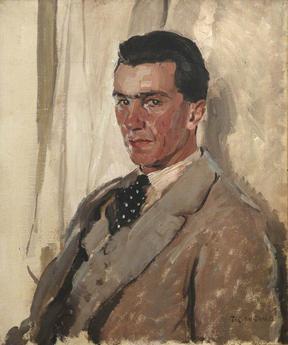L. du Garde Peach facts for kids
Quick facts for kids
L. du Garde Peach
|
|
|---|---|

Portrait of L. Du Garde Peach by Thomas Cantrell Dugdale
|
|
| Born | Lawrence du Garde Peach 14 February 1890 Sheffield, England |
| Died | 31 December 1974 (aged 84) Foolow in Derbyshire |
| Occupation | English author and playwright for radio, stage, and screen |
| Language | English |
| Nationality | British |
| Education | Manchester University; PhD at Sheffield University in 1921 |
| Notable works |
|
| Notable awards |
|
Lawrence du Garde Peach (born February 14, 1890, died December 31, 1974) was a talented English writer. He wrote many stories and plays for radio, theatre, and movies. He is best known for his amazing Adventure from History books. These were non-fiction books for children. Ladybird Books published over thirty of them. They came out between 1957 and 1974. This was the biggest series Ladybird ever made. The books were popular until 1986.
Contents
Discovering L. du Garde Peach's Life
L. du Garde Peach was born in 1890 in Sheffield, England. His father, Charles Peach, was a Unitarian minister. This means he was a religious leader in a specific Christian faith.
Early Education and Military Service
Young Lawrence went to Manchester Grammar School. He then studied at Victoria University of Manchester. In 1912, he went to Germany for more studies. Later, in 1921, he earned a PhD from Sheffield University. A PhD is a very high university degree. His studies focused on how plays developed in the 17th century.
In 1915, he married Emily Marianne Leeming. During World War I, he served in the military. He worked in military intelligence, which means he gathered important information. He reached the rank of captain.
Becoming a Full-Time Writer
In the early 1920s, Peach started writing funny stories. These were for magazines like Punch. He also taught at a university for a while. But soon, he decided to become a full-time writer.
Radio was a new and exciting way to tell stories back then. Peach wrote his first radio play in 1924. Many of his radio works told historical stories or biographies. These were often played on Children's Hour for younger listeners.
Writing for Stage and Screen
Peach also wrote many plays for the theatre. He worked closely with the Sheffield Playhouse. From 1934 to 1936, he wrote for several films. These included horror movies like The Ghoul and musicals such as Princess Charming. He also wrote for serious dramas like Turn of the Tide. He even worked on a big movie called Transatlantic Tunnel. He chose not to work in Hollywood. He preferred to have more control over his writing.
Supporting Amateur Theatre
L. du Garde Peach strongly believed in amateur theatre. This is when people perform plays for fun, not as a job. He wrote plays especially for these groups. In 1927, he started his own amateur group. It was near his home in the Peak District of Derbyshire. This group became very good.
He wrote and produced many plays for them. In 1938, he even helped create their own theatre. It was made from an old lead mining building. He also helped other local theatre groups. He even acted in a play called Ambrose Applejohn's Adventure. After World War II, he produced large theatre shows in cities like Sheffield and Manchester.
Political Involvement and Recognition
Peach also tried to enter politics. He ran as a candidate for the Liberal Party in 1929. He wanted to represent Derby in Parliament, but he was not elected.
His contributions to literature were recognized. In 1972, he received an OBE. This is a special award from the British government. In 1964, Sheffield University gave him an honorary DLitt. This is a special degree that honors his achievements.
L. du Garde Peach passed away in 1974. He died at his home in Foolow, Derbyshire. This was close to where he had built his amateur theatre group.
Selected Filmography
- Princess Charming (1934)
- Music Hath Charms (1935)
- It's a Bet (1935)
- The Crouching Beast (1935)
- Turn of the Tide (1935)
- Dusty Ermine (1936)
- The Man Who Changed His Mind (1936)
- Land Without Music (1936)
- His Lordship (1936)
- Melody and Romance (1937)
- The Great Mr. Handel (1942)
- Get Cracking (1943)
 | Leon Lynch |
 | Milton P. Webster |
 | Ferdinand Smith |

